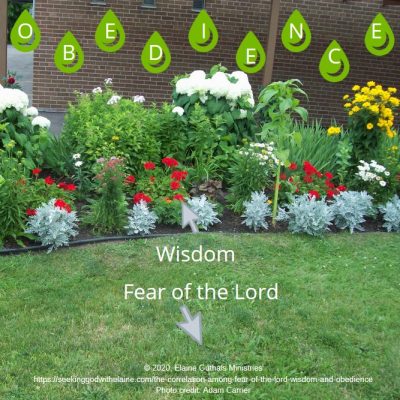What does fear of the Lord and wisdom have to do with obedience? This devotion looks at how the three are correlated.
Nuggets
- Because we revere God, we not only want to serve Him and be devoted to Him, but we also want to be like Him.
- We are not going to want to be like God until we know Him and have faith in Him.
- God’s instructions — His laws and commandments — tell us the right end and the right way to get there.
- We revere God and possess knowledge and wisdom by obeying His laws and commandments.
To read a devotion in the What Is Obedience? series, click on the button below.
The Correlation Among Fear of the Lord, Wisdom, and Obedience

The more that I delve into the Bible, the more complexities surface. I guess the saving grace with that is that they surface frequently.
Well, that is a good thing. We learn by tacking new information onto previous knowledge. If the topics have surfaced before, at least we have something on which the new information can tack!
Let’s dive in and see what we can see.
Let's Put It into Context
“Fear of the Lord is the foundation of true wisdom. All who obey his commandments will grow in wisdom” (Ps. 111: 10 NLT)
Fear of the Lord
We’ve talked about fear of the Lord before. We learned in What Does Fear of the Lord Mean? that the fear of the Lord means reverence and love, not terror. In Finding Favor by Acknowledging God, we talked about how our following God’s laws and commandments shows that we fear God.
Walking in the Spirit should promote the fear of the Lord (What Does It Mean to Walk in the Spirit?). According to What Constitutes an Obedient Disciple?, we said that, when we fear God and give honor to Him, we want to serve Him.
In What Constitutes an Obedient Disciple?, we said that outside of God, we never will be able to understand things. We have to do more than just understand God’s ways; we have to embrace them, leading to reverence.
To read a related devotion, click the appropriate button below.
Wisdom
We’ve also talked about wisdom. In How Can We Gain Wisdom?, we talked about wisdom as the attribute of having experiences, knowledge, and good judgment. Wisdom comes from God, but we can ask Him for it.
God uses the Holy Spirit to impart His wisdom to us (What is the Spirit of Wisdom?). The Holy Spirit will teach us what God has instructed Him to say. His promptings influences us to to seek God and learn more of Him. The promptings urge us to learn more deeply of Him.
To read a related devotion, click the button below.
Obedience
Obedience means to hear and carry out the instructions that God gives us (What Is Obedience?). We are to respond in faith and do God’s Will.
Fear of the Lord and Wisdom
“Fear of the Lord is the foundation of true wisdom….” (Ps. 111: 10 NLT)
Let’s focus on the reverence for a bit. It is sometimes translated as piety. Sometimes, it has been translated as religion itself. But, let’s stick with reverence here.
Partridge said that fear of the Lord encompasses “… piety in general, the service of God, and the devotion of the heart to Him.” He also said that wisdom “… is a virtue which makes a man not only skilful [sic] and intelligent, but also good and virtuous.”
Because we revere God, we not only want to serve Him and be devoted to Him, but we also want to be like Him. Being like Him is being good and virtuous. Our hearts are exactly right.
So, reverence is the foundation of wisdom. We are not going to want to be like God until we know Him and have faith in Him. Once we have ABCDed, we are called to imitate Him. We are called to be good and virtuous.
The ABCDs of Salvation
If you have not become a believer in Christ, please read through the
Plan of Salvation and prayerfully consider what God is asking you to do.A – admit our sins
B – believe His Son Jesus is our Redeemer
C – confess God as Sovereign Lord
If you have not become a believer in Christ, please read through the Plan of Salvation and prayerfully consider what God is asking you to do.
D – demonstrate that commitment by making any changes needed in our lives to
live the way in which God has called us
The Disciple’s Job Description
Arnot put it this way. He said, “The ‘fear of the Lord’ is the foundation, ‘knowledge’ is the imposed superstructure.”
Alford added a new twist to the definition of fear of the Lord. He said it is “… an abiding and reverent sense of the presence of God and of accountableness to Him.”
Ooo, baby. That adds complexity.
An “… abiding and reverence sense of the presence of God …”
Can you see that? If it is reverence and love, we have to have Someone to revere and love. It is abiding — long term, not short term.
Wisdom and Instruction
“The fear of the Lord is the beginning of knowledge; fools despise wisdom and instruction” (Prov. 1: 7 ESV).
Davies made an interesting point. He said that “wisdom consists in two things: choosing a right end, and using right means to obtain it.”
God’s instructions — His laws and commandments — tell us the right end and the right way to get there.
Wisdom can also be described as knowing the truth. That fits. “Jesus told him, ‘I am the way, the truth, and the life. No one comes to the Father except through me’” (Jn. 14: 6 CSB). Also, we learn His truths.
Instruction is “teaching or exhortation on aspects of Christian life and thought directed to persons who have already made a faith commitment” (Holman Bible Dictionary).
Paul wrote “All Scripture is inspired by God and is profitable for teaching, for rebuking, for correcting, for training in righteousness” (II Tim. 3: 16 CSB). From here is where we gain wisdom through instruction.
The Bible is our instruction book that increases our wisdom. It was specifically written to do just that.
We might be tempted to say we have wisdom when we just have understanding. Understanding is a comprehension. Taylor said that “There is need of wisdom to guide both the understanding and the will.”
Don’t get me wrong. We have to comprehend. “The fear of the LORD is the beginning of wisdom, and knowledge of the Holy One is understanding” (Prov. 9: 10 NIV).
Wisdom is equated more with righteousness. It is more application than just head knowledge.

Obedience
“The end of the matter; all has been heard. Fear God and keep his commandments, for this is the whole duty of man” (Ecc. 12: 13 ESV).
How do we show that we revere God and possess knowledge and wisdom? We obey His laws and commandments.
We take what is written in His Word and what He tells us through the Holy Spirit’s promptings — and do it.
We understand what our duties are and do it.
Orton said, “Besides living soberly, righteously, and godly, it requireth faith in Christ, love to Him, trust in Him, an humble dependence on the help of the Holy Spirit, and a compliance with the institutions of Baptism and the Lord’s Supper, which are commandments of God, as being enjoined by Jesus Christ, who was a teacher sent from Him. Doing His commandments implies avoiding everything that is evil (Job 28:28). It includes also learning to do well, and practising every duty which God requiteth of us. It is not sufficient to study the commandments of God as a science, to understand their meaning and extent, and to be able to explain them with the most critical exactness. It is not sufficient to talk of them, to admire their suitableness and excellency, but we are to do them, to do them sincerely, cheerfully, and constantly, unmoved by any temptations that would lead us to neglect the observance of them.”
We are to be obedient in following the laws and commandments — and be obedient in allowing them to change us.

Making the Connections
Wow! Is your head spinning, too?
Ever since I started pulling the research and going through it to see what I was going to write, I had this picture in my head.

Okay. So, the ground is the foundation. That is the fear of the Lord.
We plant seeds or transplant plants onto that foundation. That is the wisdom we gain by growing in grace and knowledge of God.
The plants grow through the nourishment of the rain. We grow by being obedient to God’s laws and commandments always — especially in trials.
Let’s try saying it this way. We fear God, which makes us want to dive into His Word and know Him better. That not only helps us be more obedient when the trials hit, but it also makes us more obedient all the way around.
It grows us in the right direction. Our relationship with God — our reverence and love for Him — becomes the foundation of our lives.
Go back to Alford’s definition of fear of the Lord. He said it is “… an abiding and reverent sense of the presence of God and of accountableness to Him.”
Accountablity. Because we love God and want to obey Him, we are accountable to Him.
That means we obey all the laws and commandments. We don’t compromise with the world. We don’t keep our pet sin.
We are all in.
How Do We Apply This?
- We read God’s Word.
- We study it and meditate on it so we know how He is calling us to act.
- We pray to Him asking Him to shore up the foundation.
- We allow God to change us.
In other words, we seek God. We know His character well — well enough to make it our own.
Searching for and Seeking God
Hearing His Word (Rom. 10: 17 NLT).
Reading His Word (Rev. 1: 3 ESV).
Praying to Him (Heb. 4: 16 ESV).
Studying His Word (Ac. 17: 11 NLT).
Meditating on His Word (Ps. 1: 1-2).
Memorizing His Word (Ps. 119: 11 NLT).
To read Has God Provided Everything We Need?, click the button below.
Father. We are in awe of You. That You love us enough to send Your Son to die to pay the price for our sins is beyond our understanding. But we know You did, and that sacrifice paid the price for our sins. Lord, we want our fear of the Lord to be the foundation on which we build wisdom of You. May we always be obedient to do Your Will. Amen.
What do you think?
Leave me a comment below (about this or anything else) or head over to my Facebook group for some interactive discussion.
If you don’t understand something and would like further clarification, please contact me.
If you have not signed up for the email daily or weekly providing the link to the devotions and the newsletter, do so below.
If God has used this devotion to speak with you, consider sharing it on social media.